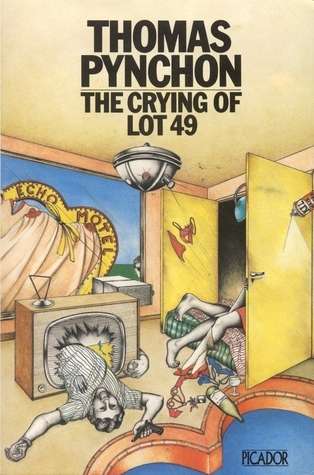One summer afternoon Mrs Oedipa Maas came home from a tupperware party whose hostess had put perhaps too much kirsch in the fondue to find that she, Oedipa, had been named executor, or she supposed executrix, of the estate of one Pierce Inverarity, a California real-estate mogul who had once lost two million dollars in his spare time but still had assets numerous and tangled enough to make the job of sorting it all out more than honorary...
The death of her ex-lover sets Oedipa on a trail of delirious weirdness which leads from her husband, Mucho Mass (who is fond of Sick Dick and the Volkswagens, but doesnt believe in them), through Dr Hilarius, Freudian shrink and ex-Buchenwald intem (If Id been a real Nazi, Id have chosen Jung, nicht wahr?), the bizarre postal network of outcasts called W.A.S.T.E, Genghis Cohen, the most eminent philatelist in L.A., Yoyodyne Inc. (High above the L.A. freeways/And the traffick's whine/Stands the wellknown Galactronics/Branch of Yoyodyne), not to mention Randolph Driblette and Messrs Warpe, Wistfull, Kubitschek and McMingus, Attorneys...
Until, finally, Oedipa stands alone, awaiting the final revelation the Crying of Lot 49.
Thomas Pynchon. is an American novelist noted for his dense and complex novels. His fiction and non-fiction writings encompass a vast array of subject matter, genres and themes, including history, music, science, and mathematics. For Gravity's Rainbow, Pynchon won the 1973 U.S. National Book Award for Fiction.
Hailing from Long Island, Pynchon served two years in the United States Navy and earned an English degree from Cornell University. After publishing several short stories in the late 1950s and early 1960s, he began composing the novels for which he is best known: V. (1963), The Crying of Lot 49 (1966), and Gravity's Rainbow (1973). Rumors of a historical novel about Charles Mason and Jeremiah Dixon had circulated as early as the 1980s; the novel, Mason & Dixon, was published in 1997 to critical acclaim. His 2009 novel Inherent Vice was adapted into a feature film by Paul Thomas Anderson in 2014. Pynchon is notoriously reclusive from the media; few photographs of him have been published, and rumors about his location and identity have circulated since the 1960s.

